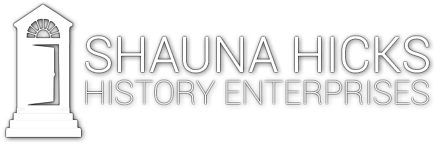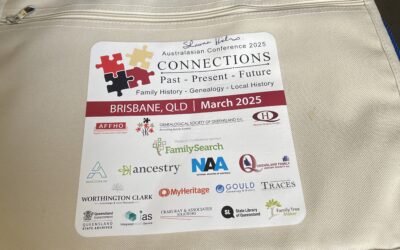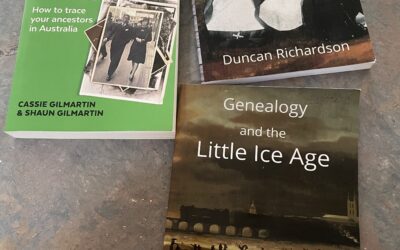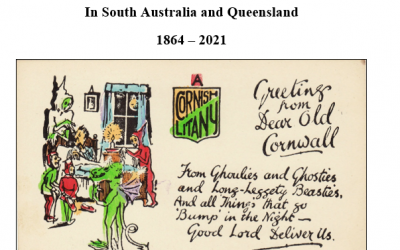This blog challenge is to stimulate my own genealogy blogging efforts in 2014 by focusing on a different kind of genealogical record each week. I wanted a challenge that reflected my own archival background as well as my own genealogy interests and there are probably lots of other records that I could have included. The challenge has an Australian focus but most of these records will be found just about anywhere in the genealogy world.
The 52 different types of genealogical records I finally decided on are listed in no particular order (each week will be a random surprise). Originally I planned to do this over 52 weeks but I now realise that I have to factor in travel and illness so it will continue a little bit over a year. Anyone is welcome to do all or part of this blogging challenge. Let me know if you are participating and I will put a link to your post under each week’s challenge.
So far I know of seven bloggers who are taking up the challenge from time to time and I have put links to their individual entries at the end of each week’s blog if they have submitted something for that week. Thanks Judy Webster, Sharn White, Cassmob, Anne, Campaspe Library and Sharon for participating and encouraging me to keep up the blog challenge myself!
Also participating in this blog challenge:
Links to Week 1 Military Medals Week 2 Internal Migration Week 3 Probates (wills and administrations) Week 4 Memorial Cards Week 5 Family Stories Week 6 Land Records Week 7 Local Histories Week 8 Diaries Week 9 Inquest Records Week 10Occupation Records Week 11 Newspapers Week 12 Gazetteers Week 13 Personal Names and Surnames Week 14 Cemetery Records Week 15 Civil Registration and Certificates Week 16 Naturalization and Citizenship Records Week 17 Court RecordsWeek 18 Almanacs Week 19 Family Bibles Week 20 Mining Records Week 21Obituaries Week 22 Family Letters and Correspondence
Week 23 Electoral Rolls
This week’s topic is electoral rolls and they can be very useful in locating people when they first enrol to vote indicating they have turned 21 years of age or 18 years of age after 1973 when the voting age was lowered from 21 to 18 years of age. Electoral rolls can also show changes of address, change of name for women after marriage, the death of a spouse or adult children leaving home. Sometimes an elderly parent moves back in with an adult child.
In Australia we have both state and commonwealth rolls and both should be checked as sometimes people only update one and not the other or they are updated at different times.
Information gained is mostly the person’s name, occupation and address but the information at different times can indicate deaths or separations or movement interstate and so on.
My mother’s maternal grandmother Dorcas White lived in Charters Towers for most of her life and the 1922 Commonwealth electoral roll has her living at Moonstone Flat, Charters Towers. However, most of her children moved to Brisbane and Dorcas followed them. The 1934 Commonwealth electoral roll has her enrolled at the same address at Paddington as her daughter Doris and her husband William Findlay. Dorcas died in 1935 so it may be that Doris was caring for her mother in those final years. To narrow down when Dorcas actually made the move from Charters Towers to Brisbane, I could look at all the electoral rolls between 1922 and 1934 which would help to pin point the year.
My own grandmother Kathleen Gunderson was living at 186 Juliette Street, Greenslopes in 1934. She had married my grandfather John (Jack) Martin Gunderson in 1934 and my father was born later in 1934. The interesting thing about this address is that it is the home of Jack’s mother Elizabeth Gunderson. An interesting start to your married life, living with your mother in law.
The 1939 Commonwealth electoral roll has Jack and Kathleen living at Beatrice Street, Greenslopes, possibly because Elizabeth had died in 1936. Another reason to use electoral rolls is that they may point to where children go to school. By 1939 my father was about 5 years old so I looked for him at the Greenslopes State School and found him enrolled there. By 1940 my father had moved to Buranda State School and this also coincided with a change of address for Jack and Kathleen. They had moved their family to Toohey Street, Buranda, the home they would spend the rest of their lives at.
On the 1939 roll, the other Gunderson family listed is Jack’s uncle and aunt Gundah and Maria Gunderson. Quite often families would live close to each other. Another good reason to look at electoral rolls if you are chasing all the descendants of an immigrant ancestor.
Electoral rolls need to be used with caution as not everyone enrols when they should and not everyone changes their address immediately every time they move. Similarly it may take time for someone to be dropped from the electoral roll after their death. However they are still a great way to trace people’s movements and to discover the names of children as they become old enough to vote.
The Queensland Family History Society has indexed Queensland school records and these records are available on CD or in Findmypast.com.au. Using these indexes may also help find people in electoral rolls if they move and you are having trouble locating them. Findmypast also has electoral rolls as does Ancestry.com.au although not every year is online. It is usually every five years but electoral rolls for every year may be located at the State Archives or the State Library if you need to see an individual year.
The examples given above illustrate how electoral rolls can be used to learn more about a family and its relationships with other family members. Now that electoral rolls are digitised and more easily accessible online, it may be time to see what else you can learn about your own families.






0 Comments